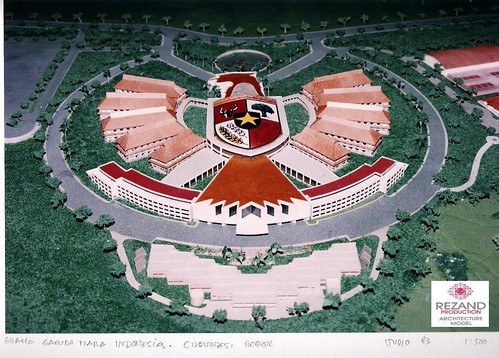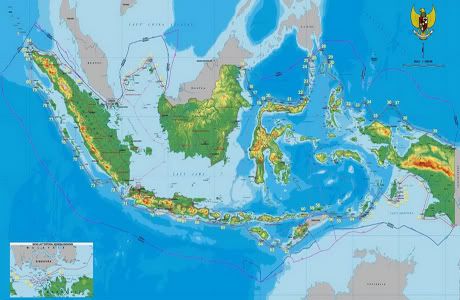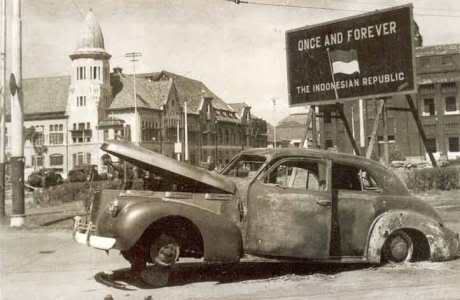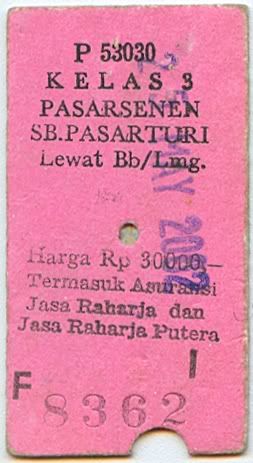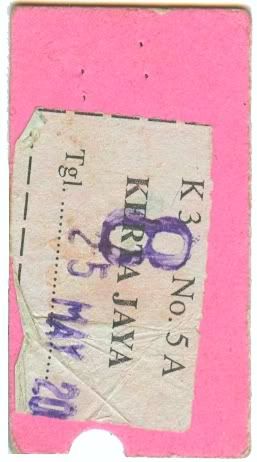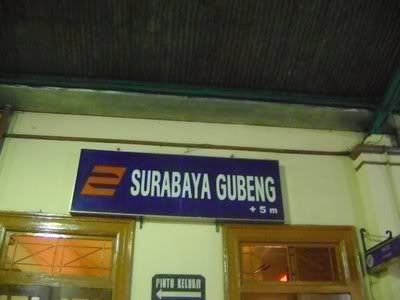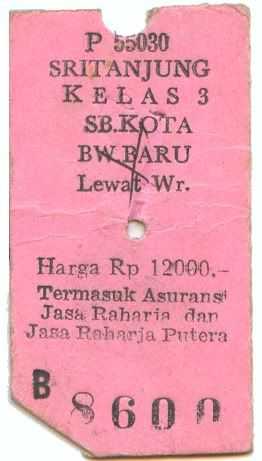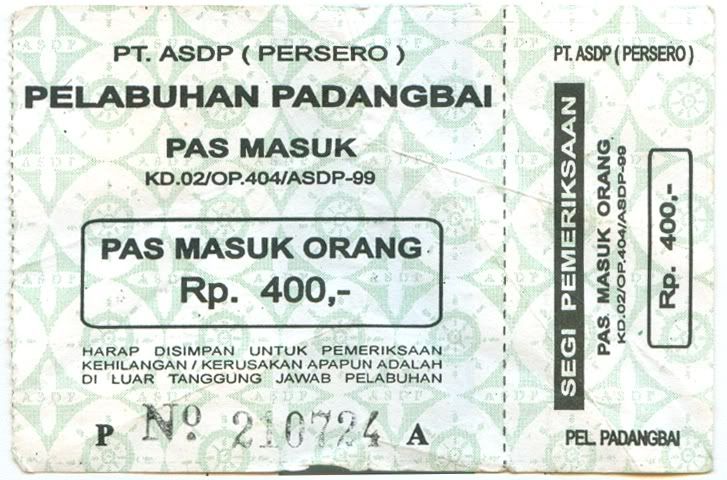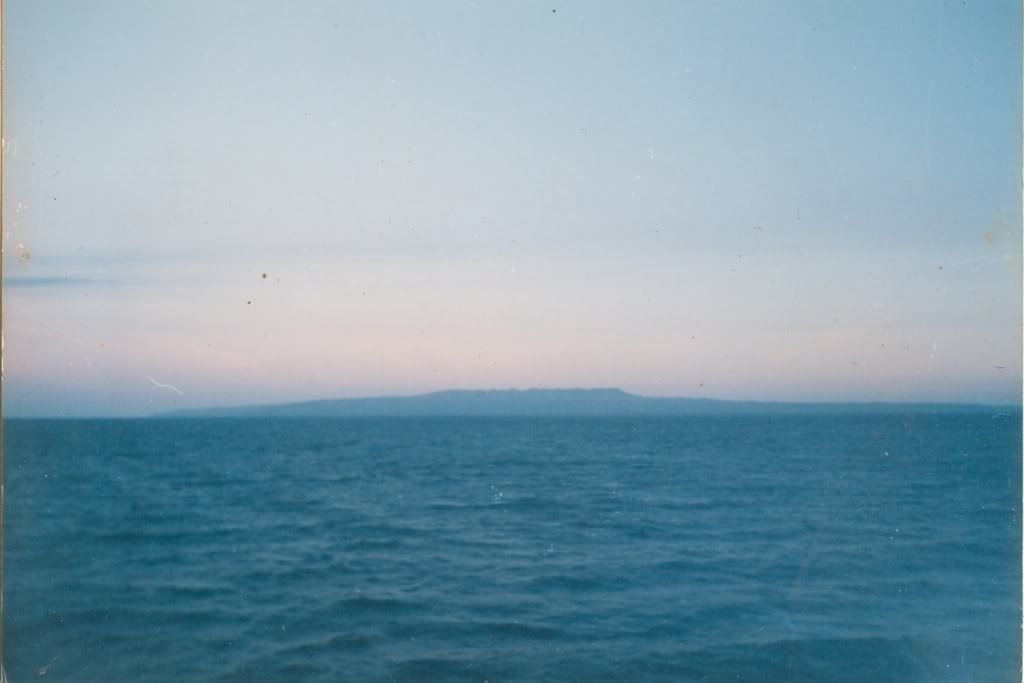PREAMBLE
Whereas independence is a genuine right of all nations and any form of alien occupation should thus be erased from the earth as not in conformity with humanity and justice,
Whereas the struggle of the Indonesian independence movement has reached the blissful point of leading the Indonesian people safely and well before the monumental gate of an independent Indonesian State which shall be free, united, sovereign, just and prosperous,
By the grace of God Almighty and urged by the lofty aspiration to exist as a free nation,
Now therefore, the people of Indonesia declare herewith their independence,
Pursuant to which, in order to form a Government of the State of Indonesia that shall protect the whole people of Indonesia and the entire homeland of Indonesia, and in order to advance general prosperity, to develop the nation's intellectual life, and to contribute to the implementation of a world order based on freedom, lasting peace and social justice, Indonesia's National Independence shall be laid down in a Constitution of the State of Indonesia, which is to be established as the State of the Republic of Indonesia with sovereignty of the people and based on the belief in the One and Only God, on just and civilized humanity, on the unity of Indonesia and on democratic rule that is guided by the strength of wisdom resulting from deliberation / representation, so as to realize social justice for all the people of Indonesia.
THE CONSTITUTION
SECTION I
FORM AND SOVEREIGNTY
Article 1
(1) The State of Indonesia shall be a unitary state, with the form of a Republic.
(2) Sovereignty is vested in the people and implemented pursuant to the Constitution. ***
(3) The State of Indonesia is a state based on the rule of law. ***
SECTION II
MAJELIS PERMUSYAWARATAN RAKYAT
Article 2
(1) The MPR consists of the members of the DPR and the members of the DPD who are chosen through general elections and further regulated by law. ****
(2) The MPR shall convene at least once every five years in the capital of the state.
(3) All decisions of the MPR shall be taken by majority vote.
Article 3
(1) The MPR has the authority to amend and to ordain the Constitution. ***
(2) The MPR installs the President and/or the Vice President. ***/****
(3) The MPR may only dismiss the President and/or Vice President during their term of office in accordance with the Constitution. ***/****
SECTION III
THE STATE'S EXECUTIVE POWERS
Article 4
(1) The President of the Republic of Indonesia shall hold the power of government in accordance with the Constitution.
(2) In exercising his duties, the President shall be assisted by a Vice President.
Article 5
(1) The President is entitled to submit bills to the DPR. *
(2) The President shall issue government regulations to implement laws as needed.
Article 6
(1) A Presidential candidate and a Vice Presidential candidate has to be an Indonesian citizen from birth, who has never received another nationality of his own volition, who has never betrayed the country, and who is mentally and physically capable of carrying out his duties as President or Vice President. ***
(2) The requirements to become President and Vice President are further regulated by law. ***
Article 6A
(1) The President and the Vice President shall be elected as a pair by the people directly. ***
(2) Each pair for President and Vice President shall be proposed prior to general elections by a political party or by a coalition of political parties contesting the general elections. ***
(3) The pair of Presidential and Vice Presidential candidates that receives more than fifty percent of the vote from the total of votes in the general election with at least twenty percent of the vote in more than half of the total number of provinces in Indonesia, shall be installed as President and Vice President. ***
(4) In the event that no pair for Presidential and Vice Presidential candidates is elected, the two pairs of candidates who have received the first and second highest number of votes in the general election shall be submitted to direct election by the people and the pair that gets most of the votes shall be installed as President and Vice President. ****
(5) The procedure to organize the election for President and Vice President shall be further regulated by law. ***
Article 7
The President and Vice President hold office for a term of five years and can afterwards be elected to the same office, for one other term only. *
Article 7A
The President and/or Vice President may be dismissed from office by the MPR based on a proposal from the DPR, either when proven guilty of violating the law by betrayal of the state, of corruption, of bribery, of any other felony, or because of disgraceful behavior, as well as when proven no longer to fulfill the conditions as President and/or Vice President. ***
Article 7B
(1) A proposal to dismiss the President and/or Vice President can only be submitted by the DPR to the MPR after filing first a request to the Constitutional Court to investigate, to bring to trial and to pass judgment over the DPR's view that the President and/or Vice President has violated the law by betrayal of the state, through corruption, bribery, any other felony, or by disgraceful behavior; and/or over the view that the President and/or Vice President is no longer capable of fulfilling the conditions as President and/or Vice President. ***
(2) The DPR's view that the President and/or Vice President has committed such a crime or is no longer capable of fulfilling the conditions as President and/or Vice President is to be seen in the framework of the DPR implementing its supervisory function. ***
(3) The DPR's request to the Constitutional Court can only be submitted if supported by at least 2/3 of all DPR members present in a plenary session that is attended by at least 2/3 of the total number of members in the DPR. ***
(4) The Constitutional Court must investigate, bring to trial and pass the fairest judgment possible over the DPR's view at the latest ninety days after the DPR's request was received by the Constitutional Court. ***
(5) In the event that the Constitutional Court resolves that the President and/or Vice President is proven guilty of violating the law by betrayal of the state, of corruption, of bribery, of any other felony, or because of disgraceful behavior; and/or if proven that the President and/or Vice President is no longer capable of fulfilling the conditions as President and/or Vice President, then the DPR shall convene a plenary session to submit a proposal to the MPR to impeach the President and/or Vice President. ***
(6) The MPR shall convene a session to decide on the DPR's proposal at the latest thirty days from the moment the MPR received this proposal. ***
(7) The MPR's decision on the proposal to impeach the President and/or Vice President shall be taken in a plenary session of the MPR attended by at least ? of the total number of members in the MPR and supported by at least 2/3 of the members present, after the President and/or the Vice President has been given the opportunity to present his explanation to the plenary session of the MPR. ***
Article 7C
The President may not lock out or dissolve the DPR. ***
Article 8
(1) If during his term the President passes away, resigns, is impeached, or is unable to carry out his duties, he shall be replaced until the end of that term by the Vice President. ***
(2) In case the position of the Vice President falls vacant, the MPR shall convene at the latest within sixty days to select a Vice President among two candidates nominated by the President. ***
(3) If during their term both the President and Vice President simultaneously pass away, resign, are impeached, or are unable to carry out their duties, the office of the presidency shall be taken up collectively by the Minister of Foreign Affairs, the Minister of Internal Affairs, the Minister of Defense. After thirty days at the latest, the MPR shall convene to elect for the remainder of the term a President and a Vice President among the two pairs for Presidential and Vice Presidential candidates who were proposed by a political party or by a coalition of political parties and who came in first and second as pairs of candidates for President and Vice President in the last general election. ****
Article 9
(1) Prior to taking office, the President and the Vice President shall take oath according to their religion, or to make a solemn pledge before the MPR or the DPR as follows:
The Oath of President (Vice President):
"I swear by God to fulfill the duties of President (Vice President) of the Republic of Indonesia to the best of my capabilities and in the fairest way possible, to uphold the Constitution by all means and to execute all laws and regulations as straightforwardly as possible as well as to dedicate myself to the service of the Nation and the People."
The Pledge of the President (Vice President):
"I solemnly pledge to fulfill the duties of President (Vice President) of the Republic of Indonesia to the best of my capabilities and in the fairest way possible, to uphold the Constitution by all means and to execute all laws and regulations as straightforwardly as possible as well as to dedicate myself to the service of the Nation and the People." *
(2) In the event that the MPR or the DPR is unable to convene, the President and the Vice President shall take oath according to their religion, or make a solemn pledge before the leadership of the MPR witnessed by the leadership of the Supreme Court. *
Article 10
The President is the Supreme Commander of the Land Forces, the Navy and the Air Force.
Article 11
(1) With the approval of the DPR the President may declare war, make peace and conclude treaties with other countries. ****
(2) When entering into other international agreements that entail broad and fundamental consequences for the existence of the people because of links to the state's financial burden, and/or because they require amendments to laws or the enactment of new ones, the President needs the approval of the DPR. ***
(3) Further provisions as to international agreements shall be regulated by law. ***
Article 12
The President declares the state of emergency. The conditions and consequences of a state of emergency shall be regulated by law.
Article 13
(1) Ambassadors and consuls are appointed by the President.
(2) In appointing ambassadors, the President shall take into account the considerations of the DPR. *
(3) The President receives the accreditation of ambassadors from other countries taking into account the considerations of the DPR. *
Article 14
(1) The President may grant clemency and rehabilitation taking into account the considerations of the Supreme Court. *
(2) The President may grant amnesty and abolition taking into account the considerations of the DPR. *
Article 15
The President may grant titles, decorations, and other insignia as provided by the law. *
Article 16
The President is to set up an advisory council whose duty it is to give the President advice and recommendations, and which is to be further regulated by law. ****
SECTION IV
DEWAN PERTIMBANGAN AGUNG
Abolished ****
SECTION V
STATE MINISTERS
Article 17
(1) The President is assisted by state ministers.
(2) The ministers are appointed and dismissed by the President. *
(3) Each minister is responsible for a specific area of governance. *
(4) The establishment, changes, and dissolution of state ministries shall be regulated by law. ***
SECTION VI
REGIONAL ADMINISTRATION
Article 18
(1) The Unitary State of the Republic of Indonesia is divided into provinces and a province is divided into kabupaten and kota, with each province, kabupaten and kota having its own regional administration, regulated by law. **
(2) The administration of a province, of a kabupaten, and of a kota shall regulate and manage its own government matters in accordance with the principles of regional autonomy and the duty of providing assistance. **
(3) Each provincial, kabupaten, and kota administration shall have its own DPRD whose members shall be elected through a general election. **
(4) A Governor, Bupati, and Mayor, each heading respectively the administration of a province, a kabupaten, and a kota shall be elected democratically. **
(5) A regional administration shall exercise the broadest possible autonomy, except for matters of governance that are determined by law as the prerogative of the Central Government. **
(6) A regional administration shall have the right to adopt regional regulations as well as other rules to implement autonomy and the duty of providing assistance. **
(7) The organization and mechanisms of implementing regional administration are to be regulated by law. **
Article 18A
(1) Relations as to authority between the central government and the administrations of a province, a kabupaten, a kota, as well as between a province and a kabupaten or a kota, are to be regulated by law with special regard for the specificity and diversity of each region. **
(2) Relations as to finance, public services, the exploitation of natural and other resources between the central government and the regional administrations are to be regulated by law and implemented in a just and synchronized way. **
Article 18B
(1) The State shall recognize and respect entities of regional administration that possess a specificity or a distinctiveness that are to be regulated by law. **
(2) The State shall recognize and respect, to be regulated by law, the homogeneity of societies with customary law along with their traditional rights for as long as they remain in existence and in agreement with societal development and with the principle of the Unitary State of the Republic of Indonesia. **
SECTION VII
DEWAN PERWAKILAN RAKYAT
Article 19
(1) The members of the DPR are elected through a general election. **
(2) The organization of the DPR is regulated by law. **
(3) The DPR convenes at least once a year. **
Article 20
(1) The DPR has the power to enact laws. *
(2) Each bill shall be discussed between the DPR and the President so as to reach a joint agreement. *
(3) If a bill fails to reach a joint agreement, it may not be introduced to the DPR again during its current term. *
(4) The President shall endorse into law a bill that has reached a joint agreement. *
(5) When a bill that has already reached a joint agreement is not endorsed by the President within thirty days after it has been jointly approved, the bill shall nevertheless become a valid law that has to be promulgated as such. **
Article 20A
(1) The DPR has legislative, budgeting and supervisory functions. **
(2) To carry out its functions the DPR, apart from the rights regulated elsewhere in this Constitution, has the rights of interpellation, of enquiry, and of expressing opinions. **
(3) Apart from the rights regulated elsewhere in this Constitution, each member of the DPR has the right to ask questions, to make proposals and to give his opinion along with the right to immunity. **
(4) Further provisions regarding the rights of the DPR and of the members of the DPR shall be regulated by law. **
Article 21
(1) The members of the DPR have the right to introduce bills. *
Article 22
(1) In compelling crisis situations the President shall have the right to issue government regulations in lieu of law.
(2) Such government regulations have to be approved by the DPR in its next session.
(3) If not approved, the government regulation in question has to be revoked.
Article 22A
Further provisions about the procedure to enact laws shall be regulated by law. **
Article 22B
Members of the DPR can be removed from office, according to conditions and procedures to be regulated by law. **
SECTION VIIA ***
DEWAN PERWAKILAN DAERAH
Article 22C
(1) The members of the DPD shall be elected from each province through a general election. ***
(2) The total number of DPD members from each province shall be the same and the total number of members in the DPD shall not be more than 1/3 of the total number of members in the DPR. ***
(3) The DPD shall convene at least once a year. ***
(4) The organization and authority of the DPD are to be regulated by law. ***
Article 22D
(1) The DPD may submit to the DPR bills dealing with regional autonomy, relations between the center and the regions, the establishment and growth as well as the merger of regions, the management of natural and other economic resources, and matters related to the financial balance between the center and the regions. ***
(2) The DPD is to participate in debates on bills dealing with regional autonomy; relations between the center and the regions; the establishment, growth and merger of regions; the management of natural and other economic resources, and matters related to the financial balance between the center and the regions; and, moreover, give its recommendations to the DPR on bills dealing with the state budget as well as on bills dealing with taxation, education, and religion. ***
(3) The DPD may supervise the implementation of laws regarding: regional autonomy, the establishment and growth as well as the merger of regions, the management of natural and other economic resources, the implementation of the state budget, taxation, education, and religion and may in addition submit the results of this supervision to the DPR as input for follow-up considerations. ***
(4) Members of the DPD can be removed from office, according to conditions and procedures to be regulated by law. ***
SECTION VIIB ***
GENERAL ELECTIONS
Article 22E
(1) Every five years general elections are to be organized in a direct, public, free, secret, honest, and fair way. ***
(2) The general elections are organized to elect the members of the DPR, the DPD, the President and the Vice President and the DPRD. ***
(3) The participants in the general elections to elect the members of the DPR and of the DPRD are political parties. ***
(4) The participants in the general elections to elect the members of the DPD are individuals. ***
(5) The general elections shall be organized by a general election commission that shall be national, permanent and independent in nature. ***
(6) Further provisions regarding the general elections are to be regulated by law. ***
SECTION VIII
FINANCIAL MATTERS
Article 23
(1) The state budget as the materialization of the state's financial management shall annually be determined in the form of a law and be implemented in an open and accountable way in order to achieve maximum prosperity for the people. ***
(2) The bill on the state budget shall be submitted by the President for joint debate with the DPR taking into account the recommendations from the DPD. ***
(3) If the DPR does not agree with the bill on the state budget proposed by the President, the Government is to implement the state budget of the preceding year. ***
Article 23A
Taxes and other compulsory levies required for the needs of the state are to be regulated by law. ***
Article 23B
The kinds and value of the national currency shall be regulated by law. ****
Article 23C
Other matters regarding state finances shall be regulated by law. ***
Article 23D
The state owns a central bank the organization, authority, competence, responsibilities, and independence of which are regulated by law. ****
SECTION VIIIA ***
BADAN PEMERIKSA KEUANGAN
Article 23E
(1) To audit the management of and accountability for the state's finances a free and independent BPK shall be set up. ***
(2) The results of the state finances' audits shall be submitted to the DPR, the DPD, the DPRD, in accordance with the competence of each. ***
(3) The audit results are to be followed through by the representative institutions and/or by other bodies in accordance with the law. ***
Article 23F
(1) The members of the BPK are selected by the DPR taking into account considerations from the DPD and shall be installed by the President. ***
(2) BPK's management is selected from among and by its members. ***
Article 23G
(1) The BPK has its main seat in the state's capital, with representations in each province. ***
(2) Further provisions regarding the BPK are to be regulated by law. ***
SECTION IX
THE JUDICIAL POWERS
Article 24
(1) The judicial powers shall be independent with the authority to organize the judicature in order to uphold law and justice. ***
(2) The judicial powers shall be carried out by a Supreme Court and by its subordinate judicatory bodies dealing with general, religious, military, state administrative judicial fields, and by a Constitutional Court. ***
(3) Other bodies dealing with judicial powers are to be regulated by law. ****
Article 24A
(1) The Supreme Court shall have the competence to try cassation cases, to review regulations made under a law against that law, as well as other competences as provided by law. ***
(2) Each supreme justice must have integrity and a personality beyond reproach, be just, professional and experienced in matters of law. ***
(3) Candidates for supreme justices are proposed by the Judicial Commission for approval to the DPR and subsequently installed as supreme justices by the President. ***
(4) The chairman and vice chairman of the Supreme Court are to be chosen from among and by the supreme justices. ***
(5) The organization, authority, membership, and judicial procedures of the Supreme Court as well as of its subordinate judicatory bodies shall be regulated by law. ***
Article 24B
(1) The Judicial Commission shall be independent in nature and have the competence to make proposals for the appointment of supreme justices as well as other competences within the framework of safeguarding and upholding the honor, the high status and the behavior of judges. ***
(2) The members of the Judicial Commission must have knowledge and experience in matters of law and an integrity and personality beyond reproach. ***
(3) The members of the Judicial Commission are to be appointed and dismissed by the President in agreement with the DPR. ***
(4) The organization, authority, and membership of the Judicial Commission shall be regulated by law. ***
Article 24C
(1) The Constitutional Court shall have the authority to make final decisions in cases of first and last instance handling the review of laws against the Constitution, to decide on authority arguments among state institutions whose competence is enshrined in the Constitution, to decide on the dissolution of political parties, and to decide on disputes regarding general election results. ***
(2) The Constitutional Court has the duty to rule on an opinion of the DPR regarding alleged violations of the Constitution by the President or the Vice President. ***
(3) The Constitutional Court shall have as its members nine constitutional justices, to be installed by the President, three among them nominated by the Supreme Court, three by the DPR, and three by the President. ***
(4) The chairman and the vice chairman of the Constitutional Court are to be elected from among and by the constitutional justices. ***
(5) The constitutional justices must have integrity and a personality beyond reproach, be just, statesmanlike, master constitutional and state administrative matters, and not hold a position as state official. ***
(6) The appointment and dismissal of constitutional justices, judicial procedures and other provisions dealing with the Constitutional Court are to be regulated by law. ***
Article 25
The conditions to become or to be dismissed as a judge are determined by law.
SECTION IXA **
STATE TERRITORY
Article 25A
The Unitary State of the Republic of Indonesia is an archipelagic state the surface and boundaries of which are to be established by law. **
SECTION X
CITIZENS AND RESIDENTS
Article 26
(1) Citizens are those who are indigenous Indonesians and persons of foreign origin who are legalized as citizens in accordance with the law.
(2) Residents consist of Indonesian citizens and foreigners residing in Indonesia. **
(3) Matters of citizenship and residency are to be regulated by law. **
Article 27
(1) All citizens shall have equal status before the law and the government and hold without exemption the law and the government in esteem.
(2) Each citizen shall be entitled to an occupation and an existence proper for a human being.
(3) Each citizen shall have the right and the duty to participate in the defense of the nation. **
Article 28
The liberties of association and assembly, the freedom of thought expressed verbally or in writing and similar rights are to be determined by law.
SECTION XA **
FUNDAMENTAL HUMAN RIGHTS
Article 28A
Each person has the right to live and the right to defend his life and existence. **
Article 28B
(1) Each person has the right to establish a family and to generate offspring through a lawful marriage. **
(2) Each child has the right to live, grow up, and develop as well as the right to protection from violence or discrimination. **
Article 28C
(1) Every person has the right to self-realization through the fulfillment of his basic needs, the right to education and to partake in the benefits of science and technology, art and culture, so as to improve the quality of his life and the well-being of mankind. **
(2) Each person has the right to self-improvement by way of a collective struggle for his rights with a view to developing society, the nation, and the country. **
Article 28D
(1) Each person has the right to recognition, security, protection and certainty under the law that shall be just and treat everybody as equal before the law. **
(2) Every person is entitled to an occupation as well as to get income and a fair and proper treatment in labor relations. **
(3) Each citizen has the right to equal opportunity in government. **
(4) Each person has a right to a nationality. **
Article 28E
(1) Each person is free to worship and to practice the religion of his choice, to choose education and schooling, his occupation, his nationality, his residency in the territory of the country that he shall be able to leave and to which he shall have the right to return. **
(2) Each person has the right to be free in his convictions, to assert his thoughts and tenets, in accordance with his conscience. **
(3) Each person has the right to freely associate, assemble, and express his opinions. **
Article 28F
Each person has the right to communication and to acquiring information for his own and his social environment's development, as well as the right to seek, obtain, possess, store, process, and spread information via all kinds of channels available. **
Article 28G
(1) Each person is entitled to protection of self, his family, honor, dignity, the property he owns, and has the right to feel secure and to be protected against threats from fear to do or not to do something that is part of basic rights. **
(2) Each person has the right to be free from torture or inhuman and degrading treatment and shall be entitled to obtain political asylum from another country. **
Article 28H
(1) Each person has a right to a life of well-being in body and mind, to a place to dwell, to enjoy a good and healthy environment, and to receive medical care. **
(2) Each person has the right to facilities and special treatment to get the same opportunities and advantages in order to reach equality and justice. **
(3) Each person is entitled to social security enabling him to develop his entire self unimpaired as a dignified human being. **
(4) Each person has the right to own private property and such ownership shall not be appropriated arbitrarily by whomsoever. **
Article 28I
(1) The rights to life, to remain free from torture, to freedom of thought and conscience, to adhere to a religion, the right not to be enslaved, to be treated as an individual before the law, and the right not to be prosecuted on the basis of retroactive legislation, are fundamental human rights that shall not be curtailed under any circumstance. **
(2) Each person has the right to be free from acts of discrimination based on what grounds ever and shall be entitled to protection against such discriminative treatment. **
(3) The cultural identities and rights of traditional communities are to be respected in conjunction with progressing times and civilization. **
(4) Protecting, promoting, upholding, and the full realization of human rights are the responsibilities of the state, foremost of the government. **
(5) To uphold and protect human rights in accordance with the principles of a democratic and law-based state, the implementation of fundamental human rights is to be guaranteed, regulated, and laid down in laws and regulations. **
Article 28J
(1) Each person has the obligation to respect the fundamental human rights of others while partaking in the life of the community, the nation, and the state. **
(2) In exercising his rights and liberties, each person has the duty to accept the limitations determined by law for the sole purposes of guaranteeing the recognition and respect of the rights and liberties of other people and of satisfying a democratic society's just demands based on considerations of morality, religious values, security, and public order. **
SECTION XI
RELIGION
Article 29
(1) The state is based on the belief in the One and Only God.
(2) The state guarantees each and every citizen the freedom of religion and of worship in accordance with his religion and belief.
SECTION XII **
DEFENSE AND SECURITY OF THE STATE
Article 30
(1) Each citizen has the right and the duty to participate in the defense and security of the state. **
(2) The defense and security of the state are undertaken through a defense and security system that encompasses the entire population with TNI and POLRI as the main powers, and the population as the supporting power. **
(3) TNI comprises the Land Forces, the Navy, and the Air Force as the state's instruments to defend, protect, and maintain the state's integrity and sovereignty. **
(4) POLRI is the state's instrument to safeguard security along with law and order among the population and has the duty to protect, to shield, and to serve the population, as well as to uphold the law. **
(5) The structure and the authority of TNI, of POLRI, the relations as to the authorities of each TNI and POLRI in exercising their duties, the conditions under which the citizens can partake in the state's defense and security, as well as other aspects regarding defense and security are to be regulated by law. **
SECTION XIII ****
EDUCATION AND CULTURE
Article 31
(1) Each citizen has the right to an education. ****
(2) Each citizen is obliged to follow elementary education and the government has the duty to fund this. ****
(3) The government organizes and implements a national education system, to be regulated by law, that aims at enhancing religious and pious feelings as well as moral excellence with a view to upgrading national life. ****
(4) The state shall give priority to the education budget by allocating at least twenty percent of the state's as well as of the regional budgets to meet the requirements of implementing national education. ****
(5) The government advances science and technology along with holding religious values and national unity in high esteem with a view to promoting civilization as well as the well-being of humanity. ***
Article 32
(1) The state shall advance Indonesia's national culture among the civilizations of the world by guaranteeing the freedom of the people to maintain and develop cultural values. ****
(2) The state shall respect and preserve the languages in the regions as national cultural treasures. ****
SECTION XIV ****
NATIONAL ECONOMY AND SOCIAL WELFARE
Article 33
(1) The economy is to be structured as a common endeavor based on familial principles. ****
(2) Production sectors that are vital to the state and that affect the livelihood of a considerable part of the population are to be controlled by the state. ****
(3) The land and the waters as well as the natural riches therein are to be controlled by the state to be exploited to the greatest benefit of the people. ****
(4) The organization of the national economy shall be based on economic democracy that upholds the principles of solidarity, efficiency along with fairness, sustainability, keeping the environment in perspective, self-sufficiency, and that is concerned as well with balanced progress and with the unity of the national economy. ****
(5) Further provisions regarding the implementation of this article are to be regulated by law. ****
Article 34
(1) Impoverished persons and abandoned children are to be taken care of by the state. ****
(2) The state develops a social security system for everybody and empowers the weak and underprivileged in society in accordance with their dignity as human beings. ****
(3) The state has the responsibility to provide proper medical and public service facilities. ****
(4) Further provisions regarding the implementation of this article are to be regulated by law. ****
SECTION XV **
THE STATE'S FLAG, LANGUAGE, AND COAT OF ARMS, AND THE NATIONAL ANTHEM
Article 35
The flag of the Indonesian state is the "Sang Merah Putih".
Article 36
The language of the state is "Bahasa Indonesia".
Article 36A
The state's Coat of Arms is the "Garuda Pancasila" with "Bhinneka Tunggal Ika" as its motto. **
Articles 36B
The national anthem is "Indonesia Raya". **
Article 36C
Further provisions regarding the flag, language, and coat of arms of the state, as well as to the national anthem are to be regulated by law. **
SECTION XVI
AMENDMENTS TO THE CONSTITUTION
Article 37
(1) Proposals to amend articles of the Constitution can be put on the agenda of the MPR session if submitted by at least 1/3 of the total number of members in the MPR. ****
(2) Each proposal to amend articles of the Constitution has to be submitted in writing and to mention clearly which part should to be amended and for what reason. ****
(3) To amend articles of the Constitution the MPR session has to be attended by at least 2/3 of all members of the MPR. ****
(4) A decision to amend articles of the Constitution requires the agreement of at least fifty percent plus one vote of all the members of the MPR. ****
(5) Especially those provisions regarding the form of the Unitary State of the Republic of Indonesia may not be amended. ****
TRANSITIONAL PROVISIONS
Article I
All existing laws and regulations shall remain valid until new ones under this Constitution come into effect. ****
Article II
All existing state institutions shall continue to implement the provisions of the Constitution as long as they have not been replaced by new ones under this Constitution. ****
Article III
The Constitutional Court has to be established at the latest by 17 August 2003 and until such establishment all its competencies shall be carried out by the Supreme Court. ***
ADDITIONAL PROVISIONS
Article I
The MPR shall review the contents and the legal status of the decisions of the MPRS and the MPR for decision by the MPR session of 2003. ****
Article II
With the enactment of these constitutional amendments, the 1945 Constitution of the Republic of Indonesia shall consist of a Preamble and articles. ****
Remarks
Up to July 2003, the Constitution has been amended four times. The asterisks used in the titles of the Sections or after a paragraph in an article, refer to the amendment concerned:
* the First Amendment of 19 October 1999
** the Second Amendment of 18 August 2000
*** the Third Amendment of 9 November 2001
**** the Fourth Amendment of 11 August 2002

